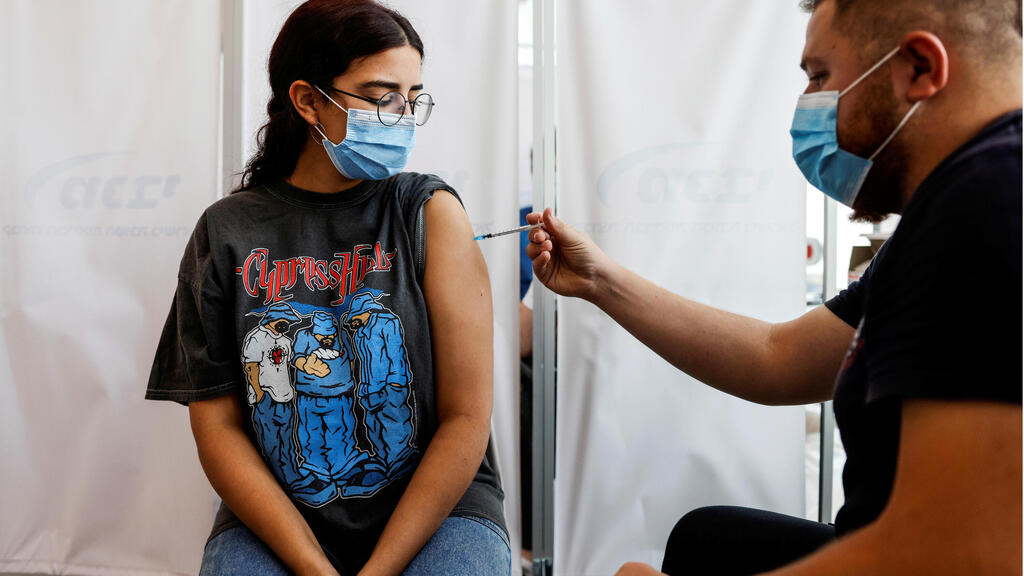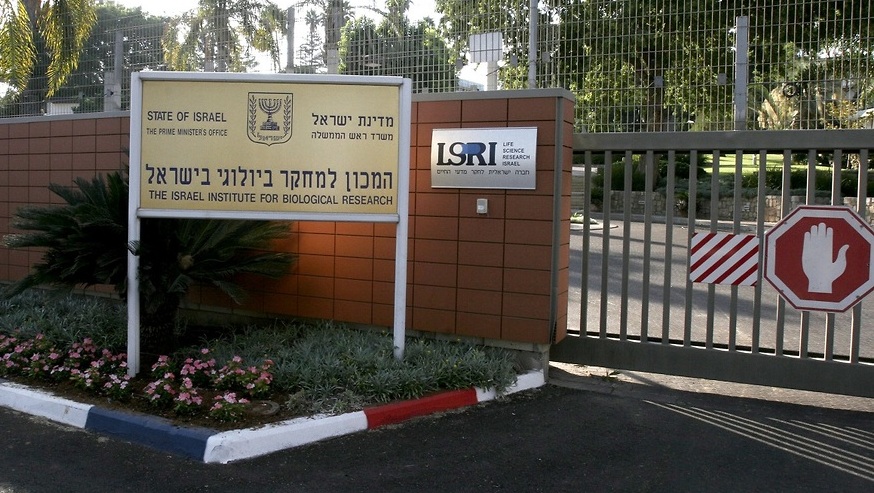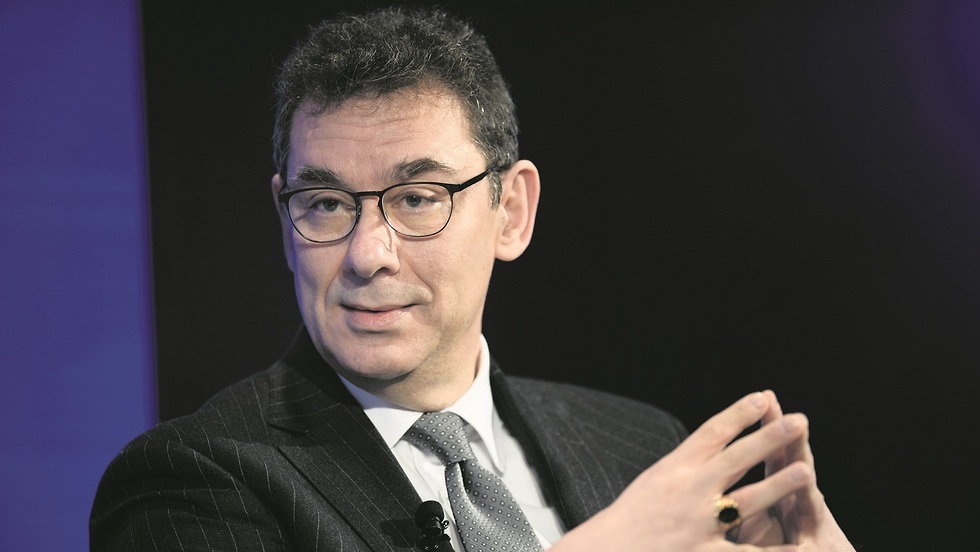Getting your Trinity Audio player ready...
Late one Saturday evening, on February 1, 2020 Prof. Shmuel Shapira's phone started ringing and an unfamiliar number appeared on the screen.
Shapira, then the head of Israel's Institute for Biological Research in Ness Ziona, one of the country's most secretive security institutions, is accustomed to unusual calls. He quickly answered and was informed that he was being summoned to a meeting with former Prime Minister Benjamin Netanyahu the next day to present an outline for domestic manufacture of coronavirus vaccines and antibodies.
11 View gallery
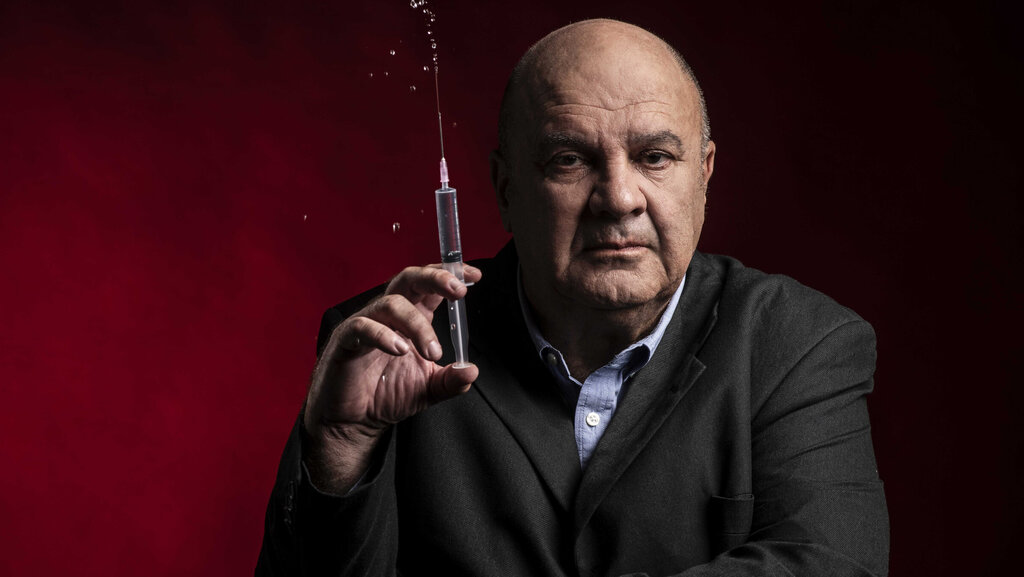

Former head of Israel's Biological Research Institute, Shmuel Shapira
(Photo: Ilya Melnikov)
And so, without much fanfare the program to develop an Israeli-made COVID-19 vaccine was born.
A year and a half after that call over five million Israelis had already been fully vaccinated. But not with domestic jabs but those developed by Pfizer/ BioNTech. At first the shots worked well, but over time their efficacy had started to diminish.
In this exclusive interview with Ynet, the father of the vaccine that never made it out of the lab says that to this day he believes his institute can complete the development of the domestic jab, which may be even better than any others currently on the market.
"There are basic needs the country must fulfill, that cannot be left to others. Especially when dealing with matters of life and death," Shapira says. "We are a big enough and important enough country to have our own vaccine,” he says.
“Maybe tomorrow we will not have such a good relationship with a certain country or company, and we will not get the vaccines as fast,” he adds, referring to the deal Netanyahu made with Pfizer’s CEO Albert Bourla, who agreed to send Israel tens of millions of doses of their SARS‑CoV‑2 vaccine in exchange for medical data on its effects on Israel’s population.
“Maybe the CEO of the next vaccine developer will decide to conduct its medical experiments on the citizens of Singapore instead. What will we do then?”
11 View gallery
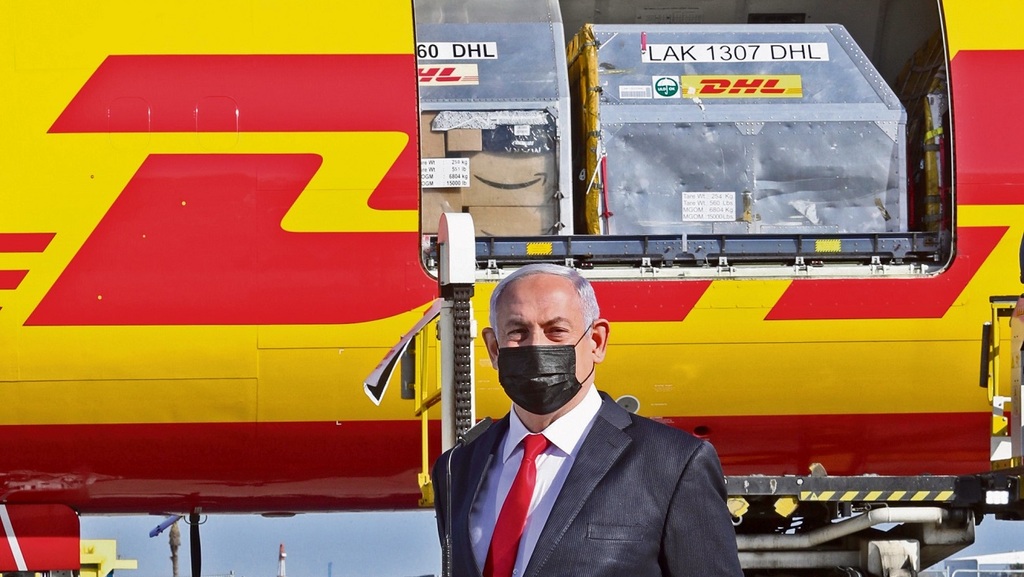

Former Prime Minister Benjamin Netanyahu posing for photos outside the cargo plane delivering Pfizer vaccines to Israel last year
(Photo: Mark Israel Salem)
But most Israelis are already inoculated. Why do we still need an Israeli vaccine?
"Because the pandemic is not over, and booster shots will still be needed."
But both former Prime Minister Netanyahu and Prime Minister Naftali Bennett said we will have as many vaccines as we will need?
"There is a terrible shortage of vaccines in the world and all the countries are after the shots. Israel doesn't want to administer locally made vaccine? No problem. There is a vast potential for export. Even without variants of SARS‑CoV‑2 the world will not be entirely vaccinated before 2023-2024, and until that happens more variants will appear causing more waves of the disease."
Is the Israeli vaccine as good as the others?
"I think it is better. We opted for an approach that is on the one hand innovative and on the other, less bold that the other vaccine makers chose. Our model has been in existence for three or four years and has shown adequate results. How many years has the method used in the other vaccines been around? Six of seven months."
11 View gallery
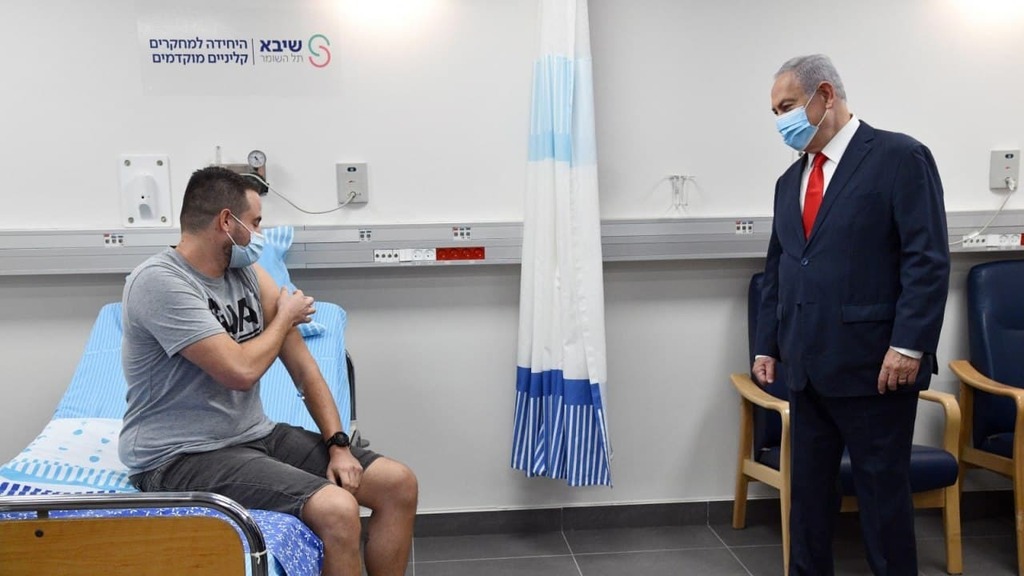

Benjamin Netanyahu visits a trial subject given the Israeli COVID vaccine in November, 2020
(Photo: GPO)
What do you think of the decision to provide a third booster shot?
"The decision is problematic. The first two shots hit their mark, sort of. I don't think it was an excellent vaccine. It was effective for four to five months and failed very quickly when mutations began to appear and it is still unclear if it prevents serious illness. It appears to hardly prevent contagion. I think the booster should have been a different vaccine altogether. That makes more sense medically and scientifically."
A different booster? Do you mean Moderna?
"I don't even think Moderna's vaccine is different enough from Pfizer's. Vaccines are like chemotherapy. When there is a serious medical problem, you try to attack it from different fronts. Here they chose to attack from the same front, with the same vaccine that is simply not suitable for the current variant. I am not sure this was the best scientific decision.”
But there are no alternatives now.
"Doing nothing is also an alternative. We are pioneers. Israel became a medical experimental lab for the world with the first and second doses of the vaccine. Now we’re doing it again with the third jab.”
An experimental lab for vaccines - a chilling term comes up over and over in the interview and in Shapira's book that is about to be released by Yedioth Books.
You write in your book that Pfizer used us as guinea pigs and I quote: "The company's CEO, (the good Jew) that saw millions of its vaccines used in Israel, told NBC that the country is being used as the world laboratory for vaccines. This is the first time in history that guinea pigs pay a fortune to be part of an experiment." Do you really feel we were guinea pigs?
"I support vaccines. They are the cornerstone of preventive medicine and there is no argument there. I think it was the right decision to vaccinate the population with the available vaccine, provided it was tested and found safe and the decisions were made after proper considerations."
So where did the experiment begin in your view?
"Israel is an excellent laboratory and I mean that in a good way. Now we have data on something like six million vaccinated Israelis. But that is assuming the reporting was accurateת but I think some aspects were under-reported. I don't think anyone tried hard enough to look for side-effects for obvious reasons. But I think a medical system that holds the information on people's gender, age, underlying conditions, side-effects and vaccination timelines – is a treasure trove."
Do you think someone purposefully underplayed the side-effects of the vaccines?
"I know from my close circle and from conversations I've had with physicians, that there are significant side-effects that could be associated with the vaccine. I don't think that they were covered up on purpose, but I think digging deeper into the possibility of side-effects was less convenient."
What side-effects do you believe were under-reported?
"Arrhythmia, unusual muscle pain. No one picked up the phone to call me or any of my family or friends to ask if we had any irregular reactions to the shots. I believe that was intentional. It was easier to ignore the subject."
But you say it is the right thing to do, to get the vaccine. So where was the experiment? When, in your view did we move from being given a good vaccine to something ethically problematic?
"I am talking about transparency. You should have been told that all of your data in your medical files is being given to a commercial company and asked if you agreed to that."
Even if the data is anonymous?
"Yes. There is no doubt that experiments must be conducted. Medicine and science must advance but it must be done honestly and with full transparency."
After all that, did you go to get the third jab?
"I, myself, am in no hurry to get the booster vaccine. On the first day that it was being administered, I heard someone say that 700 people were already vaccinated with no side-effects. That is true. I guess no one who received the shot dropped dead right away. But that is misleading. I will wait a bit to see what happens. I hope that in the meantime a serious article may be published [on the efficacy of the booster]. Maybe some reputable world authority will express its opinion on the vaccines.”
Do you think it was wrong on a national level, to give the third vaccine?
"I think it was rushed. Was it a mistake? Time will tell."
The Israel Institute for Biological Research is surrounded by an aura of mystery and secrecy.
Visitors walk through the gates of the institute and can be engulfed into two worlds: One secretive and the other open to view.
In the open part of the facility there is much pride over the development of a polio vaccine, explosive detection technology, development of antibodies and drugs, and other ground-breaking research.
In the secret section there may be pride, but no one is speaking.
According to foreign media reports, the institute develops antidotes in case Israel comes under attack from biological warfare. Other reports around the world claim the institute develops biological weapons as well.
The reports claimed that the attempt to poison Hamas leader Khaled Mashal in Jordan in 1997, and the successful assassination of Mahmoud al-Mabhouh - the chief of logistics and weapons procurement officer for Hamas - in Dubai in 2010, were all carried out with the products of the institute.
11 View gallery


CCTV footage of two Israeli assassins of Mahmoud al-Mabhouh, a Hamas official in DUbai in 2010
(Photo: Reuters)
Shapira who is 65 years old and a retired Colonel in the IDF became chief of the institute eight years ago after a long career as a physician, the deputy director of the Hadassah Medical Center in Jerusalem and head of the Hebrew University's School of Public Health.
He published more than 120 scientific papers and six books and is considered an expert in a myriad of subjects, including the use of unconventional weapons.
But from his position at the institute, Shapira had a front row seat to how Israel dealt with the pandemic. He saw the bickering, the failed management and the battle of egos.
In the months since his retirement, he wrote his book: The Pandemic Circus, which is a scathing report, a "J'accuse," on the coronavirus response. And coming from the man who stood at the head of the country's number one scientific institute for biological warfare – it is worth listening to what he has to say, even if some may not want him to be heard.
"The book was cleared by the sensor within days, but I have been waiting for a ministerial committee to approve its publication for weeks. I have an uneasy feeling that no one is keen on perhaps the most thorough report done in Israel on the coronavirus, being made public," he says.
The book begins with a firm statement: The Israeli government must appoint a commission of inquiry into the management of the pandemic. "I was there the entire time," he writes. "I heard and saw it all and was often shocked or stunned into disbelief by what had transpired."
What shocked you?
"Everyday I think to myself that the title of the book reflects what had happened. There were decisions made and then rescinded, steps taken forward and then back, positions stated and then reversed. There was a lot of public relations and a desire for public approval but no real substantive approach. It was not an entirely serious attitude or one that could inspire confidence. Lots of sleight of hand, kind of how circus operates."
11 View gallery
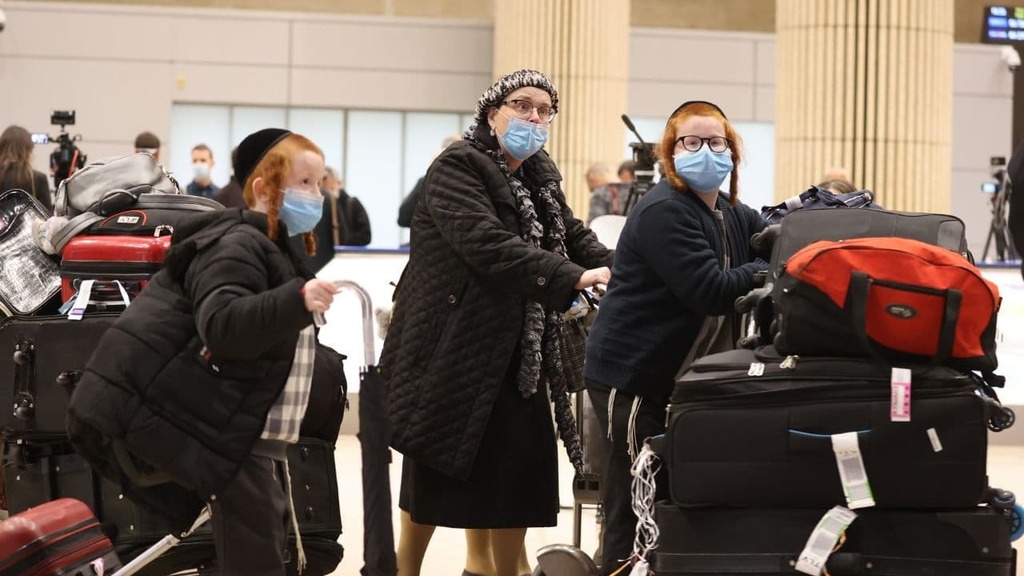

Haredi Jews arriving from New York at Ben Gurion Airport in March
(Photo: Moti Kimchi)
You start the book with a call for a commission of inquiry. Why?
"Israel has surpassed 7,000 dead [from coronavirus], with an astronomical number of impacted Israelis. You don't think that is worth investigating? This is the biggest event humanity has had to deal with since the end of WWII. I am not aware of any serious review of what had transpired here in the past year and eight months."
Do you think now is the time for an investigation, while the battle is still ongoing?
"Of course. They could launch an investigation instead of holding 12- hour-long cabinet meetings and talking endlessly in television studios."
"Who would you appoint to head such a commission?
"Professionals. This must be investigated objectively and properly. Not in order to see heads roll, but to reach conclusions and learn lessons and improve the system. There is plenty that must be improved."
And in your commission of inquiry, who do you think is responsible? Who is to blame for the pandemic circus?
"Everyone is to blame for how things were run. Sometimes ego and pursuit of personal honor triumphed instead of science and objective decision making. Whoever managed the pandemic could have done a better job, could have gotten better advice. And I, too, could have shouted louder. I should have banged on tables.
You don't name names. You don't say "Netanyahu," "Edelstein," [former Dir. Gen of the Health Ministry] Bar-Siman-Tov or [coronavirus czar] Gamzu.
"I won't name names. All I will say is that the blame lies with senior officials and managers, and also with the average citizen who failed to understand that him or her are responsible for his or her health and that of others around them.
11 View gallery
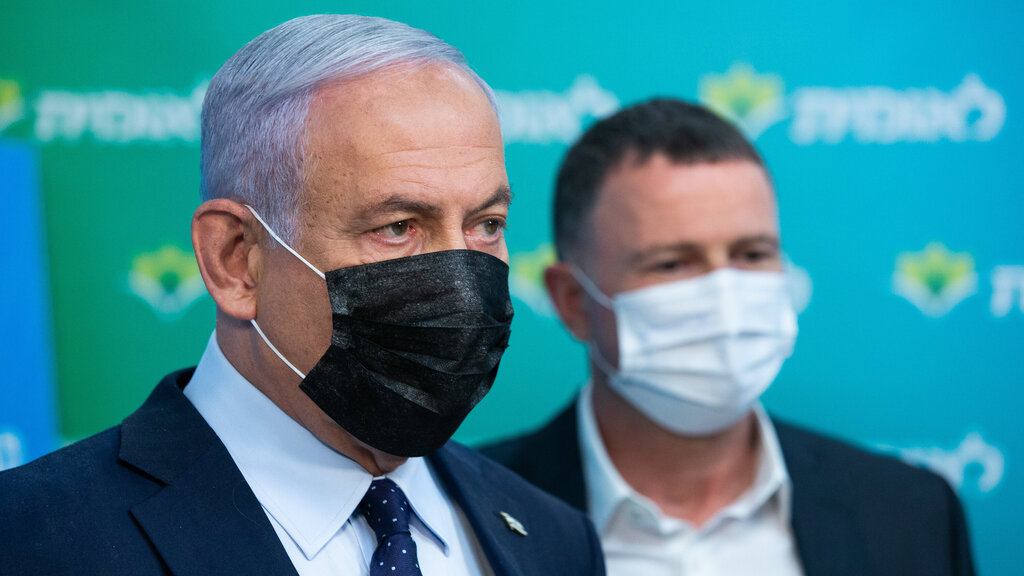

Benjamin Netanyahu with Former Health Minister Yuli Edelstein in February, 2021
(Photo: Alex Kolomoisky)
You left your job when a new government came in. Perhaps things have changed?
"The government has changed but the civil servants and officials are still there and here we are in our fourth wave of the virus. I doubt anyone thought we would be here. Even I, who was pessimistic from the start, never thought we would experience a fourth wave with the same discussions, the same meetings and only a slightly different tone.
"After 20 months, we are still not carrying out epidemiological investigations properly. I know a mother of a six-month old baby who has COVID, who received a call telling her that he will be subject to an epidemiological investigation. The system didn't even identify him as a baby. If it wasn't so sad, I would laugh. But in the meantime, the same old chorus on television goes on.
What chorus?
"The people who sit in studios from morning until night. Some are supposed to treat patients, some even run ICU's. Others - people from irrelevant fields of expertise, such as cardiology or genecology, are making the most of the situation. Science professors from universities who weigh in on whether to get vaccinated or not and talk about risk management. There has been a lot of background noise."
You say the death toll of around 7,000 is high in relation to the population. On what basis?
"Most data presentations on the virus by all sorts of organizations were demagoguery. One day for example they said Brazil had 2,400 dead and Israel 120. That sounds great but you must remember that 120 dead are the equivalent of six busses exploding on the same day. So, I multiplied 700 by 35 which is the difference between our population and that of the United States – which we all like to compare ourselves to. If you multiply 7,000 by 35 you get around 245,000 Americans. That is a lot. Compared to Japan and South Korea for instance, we are doing badly, and I'm not even talking about Australia."
So, what grade would you give Israel for its handling of the pandemic?
"If I was trying to be kind, I would give it a C-. Some systems worked very well. Many scientists, certainly in our institute, worked very well. HMOs rose to the occasion and hospitals too. The press should have been more critical and asked more difficult questions in real time."
Such as?
"What was the process in choosing a vaccine? Maybe the right one was picked but what was the decision based on? Why are the details of those cabinet meetings sealed for 30 years? And why was our vaccine not chosen?"
If you were the prime minister, what would you have done differently?
"A panel of experts should have been assembled in early February of 2020. Real experts, not politicians. The top four leading virologists, some immunologists, a public health expert and someone from the education system. We in the institute, have a team made up of strong virologists and immunologists, probably unlike anywhere else in the country and we were hardly consulted."
You write that the institute was following the virus as early as November 2019. But the prime minister only taking it seriously in February. Does that seem right to you?
"There was little known about it until January. It took a few weeks to understand that this was a fast-moving event that would break through the borders of China. Perhaps a quicker response and a better handling of the crisis by the Chinese would have slowed things down a bit if not kept the virus entirely inside that country.
What were you doing at that time?
"We were reading the genomic sequence of the virus. We started thinking about developing a vaccine and began working on one."
Before the call from Netanyahu?
"Yes. Call it an academic exercise. At some point the sequencing information was not enough, we needed the actual virus. You can have bucket loads of it today, but then it was hard to find. We approached an institute in Germany and the Sheba Medical Center to obtain the virus. We received it from the Germans within half a day and from Sheba – which is 40 minutes away from us - only after eight days."
Why? Were you not all on the same team?
"There were egos at play. This was repeated when the UK variant arrived. When we got the call from the prime minister, we went into battle mode. I identified priorities and allocated all our resources to the project. We were guided by the science and the scientists."
You were enlisted to make a vaccine for a disease you had no experience with, competing with the biggest companies in the world. Was this not simply self-promotion on the part of Netanyahu?
"I tried not to look at it from a political perspective. Those were the early days of the pandemic and no one knew who would develop a vaccine first. Even now, in hindsight, I think it was the right call."
11 View gallery
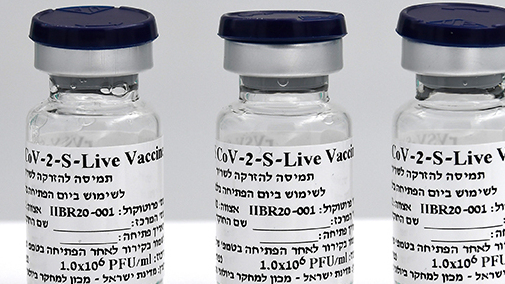

Bottles containing the Israeli made coronavirus vaccine
(Photo: Defense Ministry spokesperson)
Following months of intense work, the vaccine began taking shape. Unlike Pfizer and Moderna's version, the Israeli vaccine uses the VSV virus that poses no danger to humans, with a section of the coded DNA to target the COVID spikes. There is only one such vaccine in the world to date and that is the one developed against the Ebola virus in 2016.
The start was promising, and the early experimental stages showed it was safe, but later on it stalled. While Pfizer and Moderna were producing millions of doses, the institute lagged behind, hampered by bureaucracy. Shapira was livid.
"We were at the cusp of an enormous scientific achievement. People have yet to grasp the enormity of it. We were at the finish line with seven of the world's greatest companies. What they had done with a staff of thousands, we did with only 80 people and while they had budgets totaling billions, we were given 175 million shekels. People worked around the clock. That is why I am upset that the system around us was so slow to react," he says.
What have your experiments told you about the efficacy of your vaccine?
"It has a very high efficacy rate. We cannot say at this point anything else. People want to hear 80-90% efficacy and that is the purpose of the third phase of trials. In animal studies the Israeli vaccine is excellent. In humans it was also found to be very safe in proper dosages and resulted in a good level of antibodies. It also shows the best results against different variants."
Can it be modified for the variants?
"Yes. Including the Delta variant."
What are the side-effects?
"No substantive side-effects were detected beyond the usual ones - muscle pains, headaches."
If it were up to you, would your vaccine have been produced by now?
"If it were up to me, you would have already had it."
So, what was the delay?
"I have documentation that proves government officials worked to delay our progress for months on end,” says Shapira.
“When senior officials in the Health Ministry say the Israeli vaccine is unnecessary, it is basically a call to shut down the project. When officials in the Finance Ministry hear this, they tend to think to themselves, ‘wait a minute, maybe this project is a waste of money’. We saw real malice, in some instances,” he said.
Shapira added that in July 2020, his team was on the cusp of a breakthrough, with a real effective vaccine at hand.
“We should have and could have started the regulatory process back then. By my count, the Health Ministry rejected our pleas to start the process four times, for reasons I and many others, thought were irrelevant."
The third phase of trials for the Israeli-made vaccine will begin in Ukraine and the Georgian Republic soon, with up to 30,000 test subjects, because most Israelis have already been vaccinated. But Shapira says there was another reason for testing the vaccine outside of Israel.
"At some point we just got tired of the regulatory roadblocks," he says. "We had an effective vaccine in July of 2020 and had to begin the regulatory process. That was postponed time and time again, while the daily morbidity rate was in the tens of thousands. That was not the time for bureaucracy."
11 View gallery
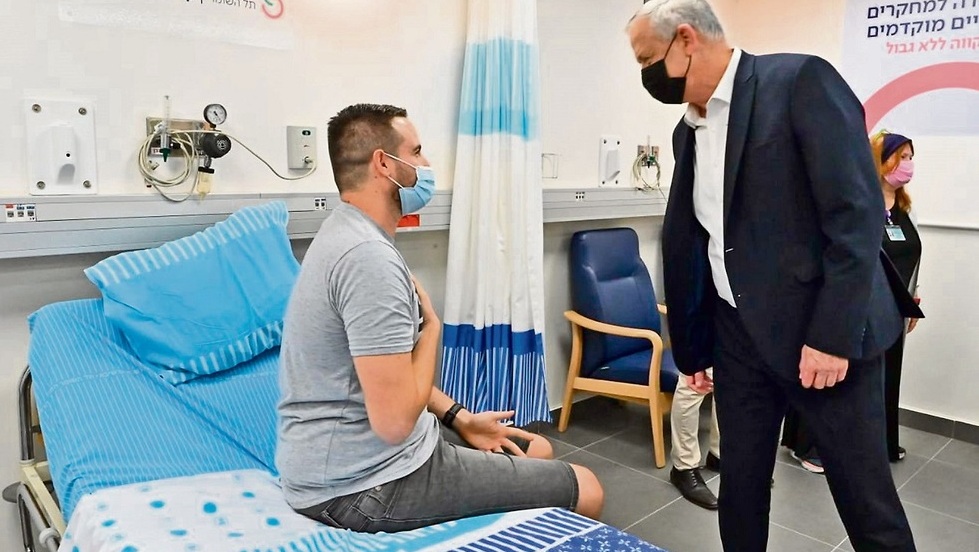

Gantz meeting the first Israeli who took part in clinical trials of the Israeli vaccine
(Photo: the Defense Ministry)
But from the get-go, your chances of registering an Israeli vaccine were low. There has never been one approved in Israel.
"There may have been issues in our process, but there was also fear. The Health Ministry showed bravery when it allowed pregnant women to be vaccinated but not when it came to the Israeli vaccine. This booster shot which is now being administered could have been locally produced. We are still receiving calls from many countries, including some in Europe and Latin America, asking about our vaccine.
"We will have results from the third phase of trials in Ukraine in a few months, and barring more bureaucratic hurdles, we can have one ready for use within 18 months. Initially, we wanted to produce 15 million doses for Israel and the Palestinian Authority, but we may have to move the production out of the country."
Shapira says an Israeli-developed vaccine would not only show the country's medical and scientific capabilities and bring honor to Israel, but also become a source of considerable income.
"So much money has been wasted on ineffective testing kits and vaccines that expired and thrown away, and here we could have had an income in the billions," he says. "One senior official told me Israel values Western companies over Israeli ones. This could have been one of the biggest scientific achievements."
You wrote that despite your repeated warnings about a world-wide pandemic you were not consulted by the leadership
"I spoke up when I could. But people had a perception that a pandemic was not possible, and they stuck to it. My only regret is not speaking out more forcefully. I should have written directly to the prime minister. I never had a one-on-one meeting with him and when his minders were around, I could not speak freely.
Meanwhile the CEO of Pfizer received every honor
"What he did was not out of some sympathy of Zionism, it was a business decision. Our scientists should have been honored."
Can you estimate what will cause the next pandemic or when it will break out?
"Even now the pandemic has changed from its early days. The Delta variant is very different from the original virus. There were five pandemics in the past century and many outbreaks of diseases such as Ebola - that began in sparsely populated areas and ended there. But globalization accelerates the speed by which viruses spread. The cities are more crowded, there is travel, urbanization spreads to forests and invades nature, so this will happen again.
"There are many who cannot get vaccinated for health reasons and are on immunosuppressing treatments. They may be hosts of the virus that will multiply, grow in strength and spread to others.
"The world will be able to develop vaccines against viruses but must also adopt safety measures like keeping a distance between people and maintaining personal hygiene."
There was a report published in England that said the virus could mutate and become even more deadly. Do you think that is a possible scenario?
It is, but the virus can only survive if its host is alive. That is why Ebola, which is very deadly, is slower to spread. COVID as a virus may not benefit from being more deadly. It is deadly enough already, in my view."
.


